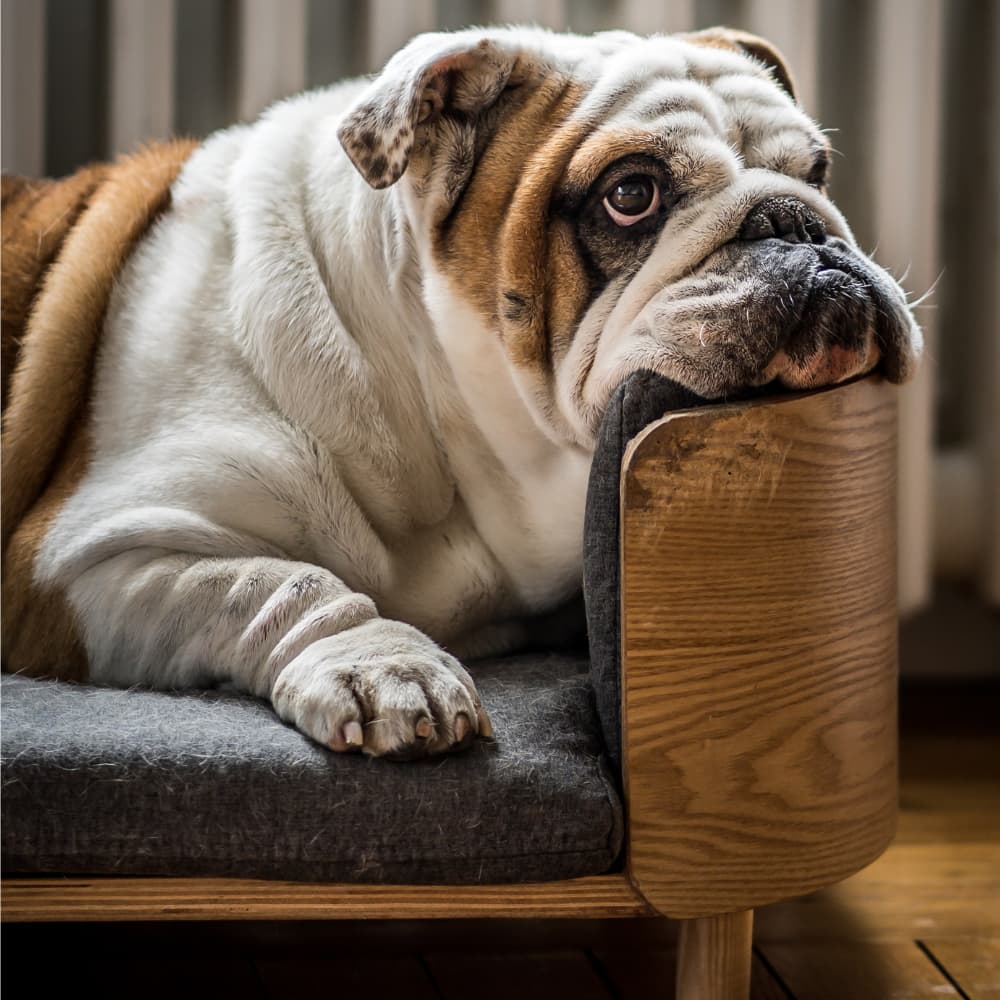
The Top 10 Laziest Dog Breeds
If you feel like getting yourself a four-legged friend but don't like going on long walks and playing fetch 24/7 keep reading to choose the perfect lazy dog breed for yourself.
10. Basset Hound
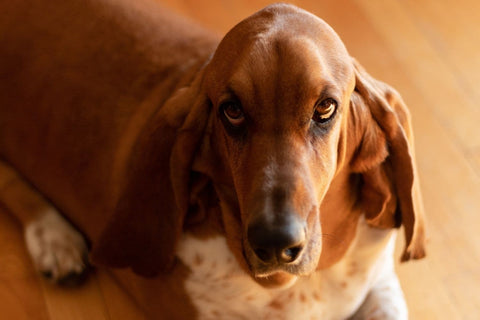
While these adorable and pleasant-natured dogs love being lazy they require a fair dose of daily exercise to keep fit. They might appear small, but an average Basset weighs anywhere from 22 to 27kg (50 to 60lbs). Improper feeding and inadequate workout can lead to a Basset getting fat and having serious legs & spine issues.
Always keep your Basset on a leash or in a fenced area as they were bred to be a hunting dog with and have an incredibly powerful nose. Once they pick up a smell they will go after it and there is not much you can do to stop them.
They are notorious for barking and baying if they get bored and are incredibly slow to respond in case of a housebreak.
To conclude, Bassets are one of the most good-natured out of all the breeds and get along well with humans and other dog breeds. Highly sociable and love to hang out with everybody. Slow to train but willing to work on it. Howling, baying, slobbering is an everyday thing.
9. English Bulldog
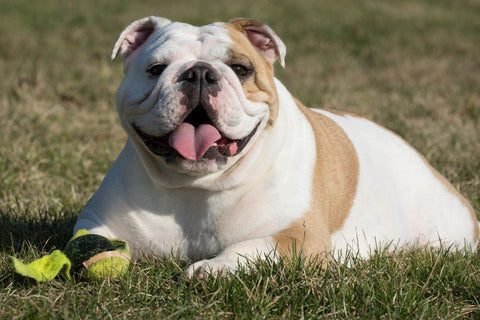
Known for their 'wide' appearance the English Bulldogs are one of the most famous (and most loved) dog breeds in the world.
Incredibly friendly and loyal this gentle squish-faced dog is great around other dogs and even other animals. English Bulldogs are often known as 'stubborn dogs' that often do things their way so proper training and socialization are crucial in owning a well-behaved dog.
Being a very lazy dog by nature the English Bulldog doesn't require a lot of workout. A simple 30 to 40 minute walk every day should be enough but don't hesitate to get more exercise going in case you notice your Bulldog is gaining weight.
Whatever you do, make sure your Bulldog doesn't overheat. Provide them with enough water and shade (especially in the summer) as they naturally have small and narrow nasal passageways.
In conclusion, the English Bulldog is a courageous, but very friendly dog. They are quite lazy and love sleeping. Most likely will snore and they might slobber a bit. Great for apartments because they don't prefer a lot of outside activities.
8. Cavalier King Charles Spaniel
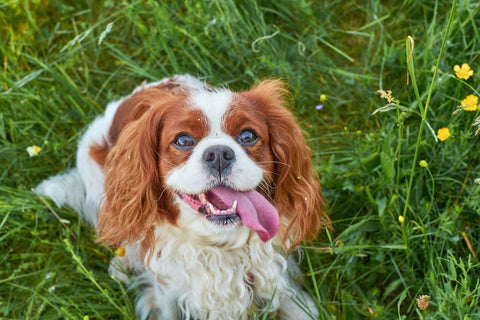
These adorable dogs originate from the UK but have jumped to the 19th most popular dog breed in the US since the year 2000. It is nothing weird as they are incredibly loving and unlike other smaller breeds, they are naturally quiet and don't bark excessively.
On average Cavaliers require anywhere from 30 minutes up to 1 hour of daily walks or playing fetch to keep fit. If you have the time, they will love to play more but won't mind just laying back and relaxing.
Cavaliers are a small breed ranging from 6 to 13kg (13 to 28lbs) so they aren't good protectors against intruders. Their kind-hearted nature is another reason they couldn't be good guards. The ability to quickly become friends with other dogs, animals, and kids makes them a great companion.
If you want to have a buddy that loves napping, every other living being and requires just a little bit of exercise the Cavalier King Charles Spaniel is the dog for you.
7. Italian Greyhound
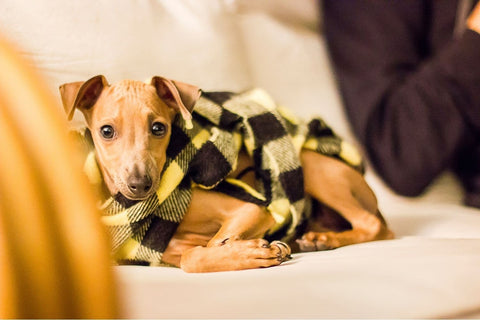
Popular among royalties across Europe these tiny dogs were company to the Medici family, French kings Louis XI & Charles IX and even Queen Victoria. This doesn't mean they were just lapdogs. While tiny and weighing under 5kg (11lbs) they have the endurance and determination to hunt smaller animals. Today that is used in the show ring in competitions.
Italian Greyhounds puppies need minimal daily exercise because they are very fragile at a young age. As they grow up they will need about 40 to 60 minutes of vigorous daily activities to fulfill their needs. Always keep them on a leash as they are prone to chasing anything that moves. Old habits really do die hard.
Italian Greyhounds are smart and sensitive dogs that are very fond of their humans and shy around strangers. They won't hesitate a chase after another animal and might will most likely get cold during the winter. A jacket and shoes are recommended.
6. Bullmastiff
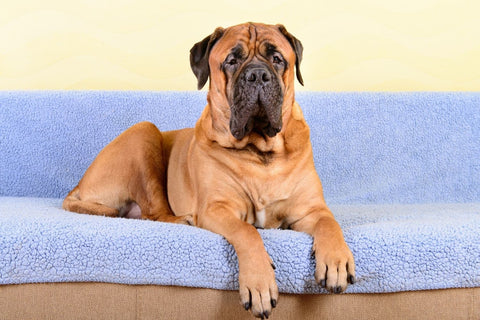
The Bullmastiff is a relatively young breed dating back only to the mid 19th century. It was bred to be fearless and large enough to defend estates in England. It was created by crossing the English Mastiff with the now unfortunately extinct Old English Bulldog.
A couple of short walks or games of fetch should be enough to fulfill their daily needs of exercise. Their favorite thing is definetely cuddling up next to you on the couch/bed and just relaxing. If you're ready for some slobbery kisses the Bullmastiff is the way to go.
Bullmastiff can be independent but loves pleasing and doing what his humans tell him to do. They are very protective of their family members but will not show aggression towards anybody who is not a part of their family unless (really) provoked.
Given their large size the best environment for them is a fenced yard. This will help them from escaping and at the same time will prevent them from expanding their territory and being protective of it.
5. Boston Terrier
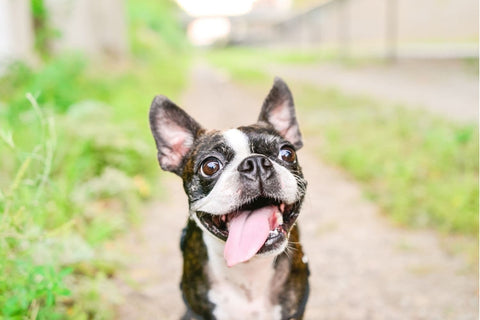
Sometimes mistaken for a 'Frenchie' the Boston Terrier is the result of crossing an English Bulldog and a White English Terrier. While the two breeds look alike the Boston Terrier has longer legs which gives them a slight advantage over the Frenchie.
The Boston Terrier was bred as a fighting dog in the past so they are medium energy dogs. They love cuddling and being lazy but can have bursts of energy that require activities. The best activities are walking and running. Remember, their short nose means they can overheat easily so always bring fresh water for you dog and get them into a cool place if they start overheating!
One of the most docile dog breeds out there, they love their family members very much and get along well with other people and dogs.
The biggest advantage is that they don't drool and shed a minimal ammount of hair. If you live in an apartment this is a thing to consider when choosing a dog breed.
4. Bichon Frise
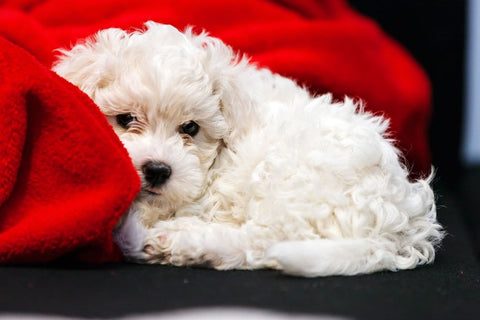
Half dog & half land cloud the Bichon Frise is a real handful despite being small. They sleep between 12 to 14 hours a day but will sometimes get a burst of energy that will have to use. It's best to let them run around or play fetch.
Bichons adapt incredibly well to apartment living but still require their daily walks or playtime (which they live for). The biggest problem many owners might stumble upon is leaving their Bichon alone for a longer period of time. They can't stand being alone so if possible take them with you anywhere you go.
If they must stay alone at home, a crate is a must to keep them calmer and reduce the probability of throwing a tantrum. If trained well, any dog will see their crate as a place to relax and enjoy.
Another large problem is grooming. Regular grooming isn't enough to keep these cuties fit and you will most likely have to pay a professional groomer to take care of your fur baby. Paying will most likely be the only problem, as almost all Bichons are incredibly friendly and calm around other people (groomers included).
3. Chow Chow
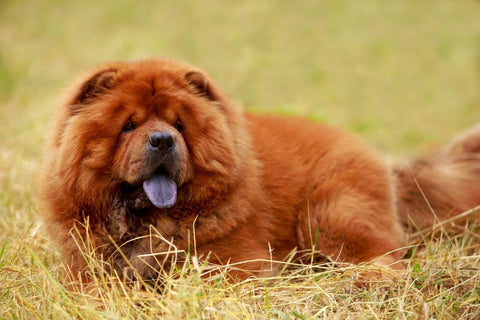
Often seen as an aggresive dog the Chow Chow is actually a well-behaved dog if trained properly. While they can be trained to behave, most Chows usually don't fancy strangers and will be very suspicious of anyone unfamiliar to them.
Chows don't like cuddling and a lot of physical contact, but they can make for a great quiet companion. They still love their family members, just don't show it in a traditional way.
Chows can adapt to many kinds of homes, but because of their thick and long fur they can't handle heat well. Always make sure to give them enough water and keep them in a cool place. especially if it is really hot outside.
2. Pug

The Pug is one of the most famous and most loved dog breeds across the globe. Known for their funny personality they love being goofy and won't try to hide it.
Pugs find it really difficult to understand where they can go potty and where they can't so a crate can be helpful. Apart from doing their business outside and going out to play (when it's not too hot), they should mostly spend their time inside where it is cool and not too humid. Their short noses restrict airflow and might cause overheating. Always provide your Pug with fresh water as well.
Pugs tend to shed a lot even though they have short hair. New Pug owners should also be prepared for a lot of snoring as their dogs will sleep for 14 hours a day on average and will snore through the whole process.
They are incredibly attached to their humans so Pugs should not be left alone for a longer period of time. They get along well with kids, adults and other animals.
1. Great Dane
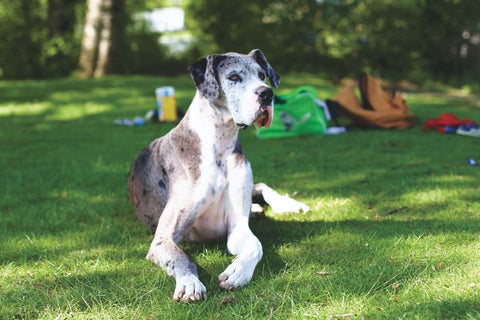
The Great Dane is an absolute lazy gentle giant. Adult Danes are on average 78cm (31") tall where males weigh about 70kg (155lbs) and females weigh about 52kg (115lbs).
They require early socialization in order to become well behaved. If done properly, they will greet everyone with joy and friendliness unless they feel you are in danger. Great Danes love children and are incredibly affectionate.
Puppies are filled with energy and will require about 90 minutes of playtime and walks per day. Once they turn 2 years old their energy levels will decrease. Adult Danes require anywhere from 30 to 60 minutes of daily activities.
They will spend most of their free time sleeping. To be exact from 16 up to 18 hours a day. Great Danes are true couch potatoes that will love to snuggle up next to you and enjoy your company.
Thank you for reading. Hopefully you found this article fun and interesting! Until next time.
Stay pawsome! 🐶
